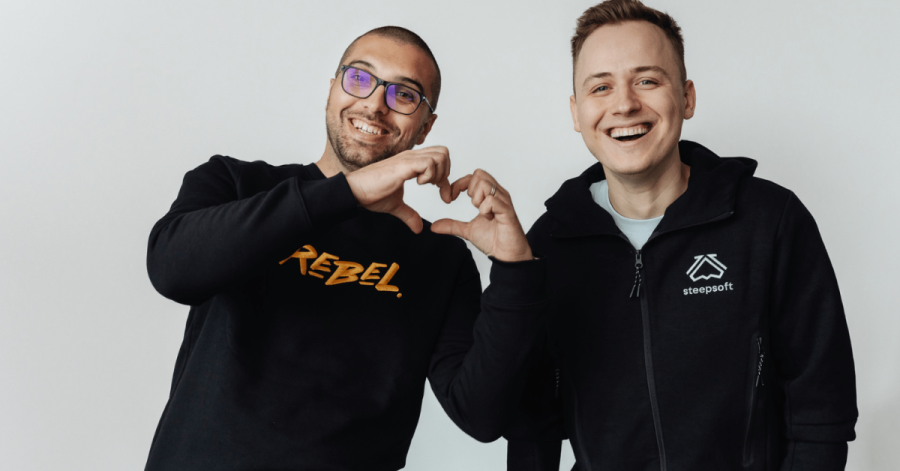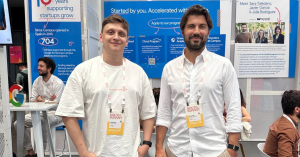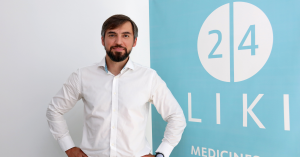“I’ve recently read an article about a team of researchers from Canada who is building a new antibiotic drug using AI. Such advancement was only possible quickly because the industry had switched focus to AI and invested in this technology. We have to look past the large language models and the solutions that allow you to write an email quicker and look at the impact AI has on other industries. It is a fantastic time to start working and building in AI,” Vadim Fintinari, CEO of steepsoft, shares with evident enthusiasm.
Mid-interview with their leaders, I get why the two teams at RebelDot, a software development company, featured as one of Financial Times’ 1000 fastest-growing firms, and steepsoft, an AI development company, have recently joined forces through an acquisition. It’s not just because they are both based in Cluj-Napoca, Romania. They share the same interest in leveraging local engineering talent to innovate beyond the AI hype.
Following this strategic move, RebelDot, led by Tudor Ciuleanu, aims to support its clients with the latest AI innovations such as Large Language Models, Data Science, and ChatGPT / GPT 4 as part of their digital products.
We talk at length about the vision for serving the local and international market’s growing demand for AI-enabled products and services, the role of the open-source community in the latest AI hype, how blockchain technology and AI can define a new law for content creation, and where CEE stands regarding AI development and adoption.
The Recursive: Congratulations on the acquisition. Why was now a good time in the growth journey of RebelDot to take this step?
Tudor Ciuleanu: It was a natural step that came at a perfect moment, as everyone is currently talking about AI. People may think we seized this opportunity, but the acquisition has been in the making for about a year.
As both companies are from Transylvania, we’ve been working together on various projects, and Vadim’s team did all the AI work. Last year, we started discussing the strengths of each team and how we could do more together. So, we decided on this acquisition to add AI capabilities that will allow us to bring more value to our clients.
With RebelDot, in 2019, we entered the web3 and blockchain space. With the acquisition of Steepsoft AI, we also entered the AI space. In addition, last year, we employed a Sustainability Officer and started to focus on sustainability, which, as far as I know, is unique in the IT industry in Romania. So, now we are covering three trends that will define the future: Web3, AI, and sustainability.
What does this milestone mean for Steepsoft AI?
Vadim Fintinari: This acquisition is a confirmation of the value that we bring to the market and also to the lives of the users we serve. Although we have been in this space for quite some time, the recent shift in the industry’s attention toward AI has helped tremendously during the past ten months.
Right now, we plan to accelerate what we do best. We have a diverse team because AI services or AI solutions take work; you need to integrate them into web mobile desktop products. But moving forward, our focus will be more on AI data engineering and, in general, the deep tech space.
We will leverage RebelDot’s experience in growing a strong and diverse company. With their help, we expect our company to grow three times in value in the next 24 months. It’s achievable once we focus on our core strengths and leverage the operational value that RebelDot has gained over the years as one of the fastest-growing companies in the industry in Eastern Europe.
What do you make of the latest AI hype cycle, and how do you think it will shape the business environment in the years to come?
Vadim Fintinari: I’ve been through a fair share of AI advancements and headlines. Every couple of years, there is a related topic that people gravitate towards. But this time, it’s different because AI has finally received approval from the market to develop to its maturity. Many of the solutions we see in the market have been around for years in one form or another. I think what has changed in the industry is the fact that AI solutions finally got the market’s approval.
Cutting through the smoke and the hype, we see amazing things that happened in the past months or even less. I’ve recently read an article about a team of researchers from Canada that is building a new antibiotic drug using AI. Such advancement was only possible, in this timespan, because the industry had switched focus to AI and invested in this technology.
We have to look past the large language models and the solutions that allow you to write an email quicker and look at the impact AI has on other industries. It is a fantastic time to start working and building in AI.
Another essential part of the AI discussion is the open-source community. After an email leaked from Google, we learned that they were competing with Open AI models constantly, but also that a person inside the team raised the point that they might also be in competition with the open source community. There’s so much advancement in the open-source community regarding the democratization of AI. Until now, it was hard to research and build new AI tools. But now, these models get open-sourced so quickly that it feels like there are ten new solutions to a problem every day. I very much enjoy the space as it is at the moment.
What are some of the applications of AI you are most excited to bring to the local market shortly?
Vadim Fintinari: As we speak, we are exploring different solutions based on AI with current and potential clients. And these can use large language models innovatively, not just generating text or answering some factual information based on context, but using large language models to classify content and understand it better. Such solutions include document processing and many others that are enterprise-focused.
Another direction would be around image generation in the creative industry. We have been speaking with companies developing solutions that rely heavily on image-generation engines.
The third pillar of focus is prediction and estimation based on data. This is a problem that many companies have. Although they own a lot of data, they do not use it meaningfully. We’ve discovered that by talking with clients, they are sitting on this gold mine and need to use it effectively. So we’re looking to explore how AI can help them leverage that data to make the business more predictable and efficient and scale some services inside the company. It doesn’t mean that we’re looking to replace people. We’re helping these businesses make the best of their people’s time.
Where does CEE stand regarding AI innovation compared to other markets? How can we further improve opportunities for AI development, deployment, and sales from the region?
Tudor Ciuleanu: I’m generally an optimist, but also a realist regarding the current situation. As we know from multiple studies in the past years, when discussing innovation, Eastern Europe is at the end compared to Western Europe. Romania and Bulgaria are usually fighting for the last position. There are many reasons: we don’t have a culture of innovation and entrepreneurship, we are afraid of risk-taking, and so on. But this is changing.
In the IT industry, it used to be the case that having high salaries makes you quite comfortable, and you don’t want to take a risk and give up your well-paid job. But at the same time, many people in the outsourcing industry have worked on exciting products and developed competitive skills in technology. And they are starting to join forces with others from other domains and backgrounds, and we start seeing interesting startups taking off in Romania.
So in the future, for sure, innovation is going to increase. How much is AI going to play a role in this growth? That’s hard to tell. We want to be on the leading edge with this acquisition and work with local startups. We have also founded Rebel Ventures, an investment mechanism of Rebeldot that helps startups with technology or investment for equity. With the acquisition of Steepsoft AI, we will also support startups with what they need on the AI side.
Vadim Fintinari: I want to address a point that Tudor mentioned. People tend to see the service business as less innovative because, as you said, you become comfortable at the bottom of the innovation ladder, just executing a specific vision. Still, it’s also an opportunity to get exposed to great products from Western Europe, the US, and so on and get accustomed to the innovation process. And then we see these exact engineers come back or start building innovative products and services in the country.
I also have a background in outsourcing companies, where I worked with big companies in Western Europe, and after I discovered the level at which tech is built there, I found a way to innovate in that space and create products. And at Steepsoft AI, we actually have an interesting approach where we don’t sell our full availability. Still, instead, we invest our availability in our own products and provide tech for equity for startups like Rebel Ventures. So we also invest highly in innovation and building products for ourselves. Building products help us leverage a product-first mentality in our services to companies and help them serve their customers in the best way.
I also think the technology being built is democratized because it has become a commodity. It is often made in the West, but it is getting commoditized fast through the open-source community. Now, Romania has companies using these tools to deliver better products and services. Technology is not bound to a region; you shouldn’t feel trapped because of a lack of regional innovation.
What do you think about the potential risks of developing and deploying AI solutions?
Vadim Fintinari: I recently listened to an excellent podcast with a former top AI researcher from Google who has left due to concerns about AI being developed in a direction that doesn’t speak to his values. And it’s been an exciting discussion that opened my eyes. AI is a tool, and as with any device, it can be used for good or bad reasons. And one thing that I started to understand better lately is how it can be used for malicious purposes.
AI doesn’t need access to infrastructure or physical objects to get malicious; it only needs to convince you that something is true. I am sure that you have experienced getting a wrong answer from ChatGPT and thinking it’s correct only to discover it isn’t. Misleading people will be the biggest challenge with AI in the future.
Content creation and social media will be wholly transformed, too. It could become challenging to distinguish human from artificial content, and we expect a lot of regulation in that space, ensuring that creating and posting content will have some traceability. Many people have said blockchain is a solution searching for a problem, and AI has finally pointed to that problem in the content space. Blockchain can become a digital layer of governance around content to prove that it’s linked to a specific source, considering the threats we face with fake, deep fake, and misleading content.
Tudor Ciuleanu: If AI is not handled correctly, scenarios that seem apocalyptic may become a reality, but I also think this applies generally to any new technologies. The massive data theft was impossible before computers, the internet, and the cloud. That said, we do need tools to fight back.
Tell us more about how blockchain can add a layer of transparency and security to AI and how this would look in practice.
Vadim Fintinari: What I meant there is that, in the near future, probably every piece of content generated by any publisher or entity will need to have a cryptographic signature attached, and all that should be added on a distributed or immutable database so that you know it hasn’t be tampered with and you can trust that publisher. This could become the new law of publishing.
Tudor Ciuleanu: Taking away everything built on and around blockchain, in essence, blockchain is a ledger that cannot be changed. It keeps history, and you cannot make changes, which you can do in other databases. That’s why a perfect application of blockchain is preserving history and storing digital signatures of assets. Thinking that content can be human-generated as well as AI-generated and that styles and voices can be faked, you should have a way to check whether the piece is original or fake.
You also mentioned a focus on sustainability at RebelDot in the future. What does that entail?
Tudor Ciuleanu: As I mentioned, last year, we hired our full-time ESG Officer with the goal of helping us do good, especially since we’re on the supply side of the chain, and we know that is where 80% of the carbon footprint originates.
As a priority, we want to improve our own operations. Now, we are finalizing our calculations for our carbon footprint; then, we will work on a strategy to reduce it in the next few years with a Net Zero goal.
Secondly, we started looking at startups in the sustainability space because we already have projects with some of our clients in the green energy and forest preservation spaces. This weekend, I’m going to Denmark to be part of the Creative Business Cup, a large international startup competition. And next year, we want to organize a Romanian edition of the Creative Business Cup with a sustainability theme.
Next, we will be thinking of how we can use AI to help our clients, which are in the sustainability space, improve. Or whether we can develop products combining these different trends. But it’s too early in the journey to tell.








